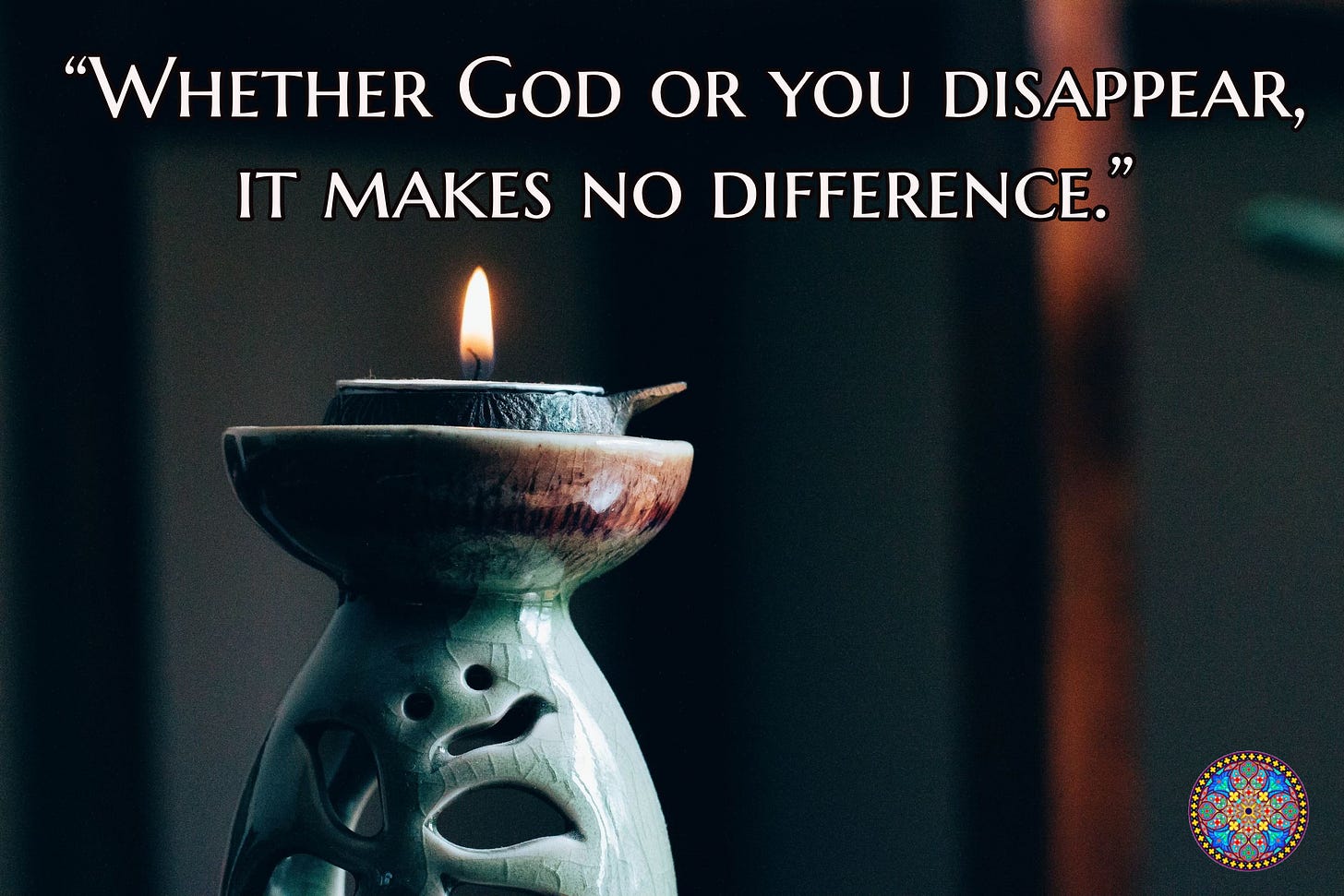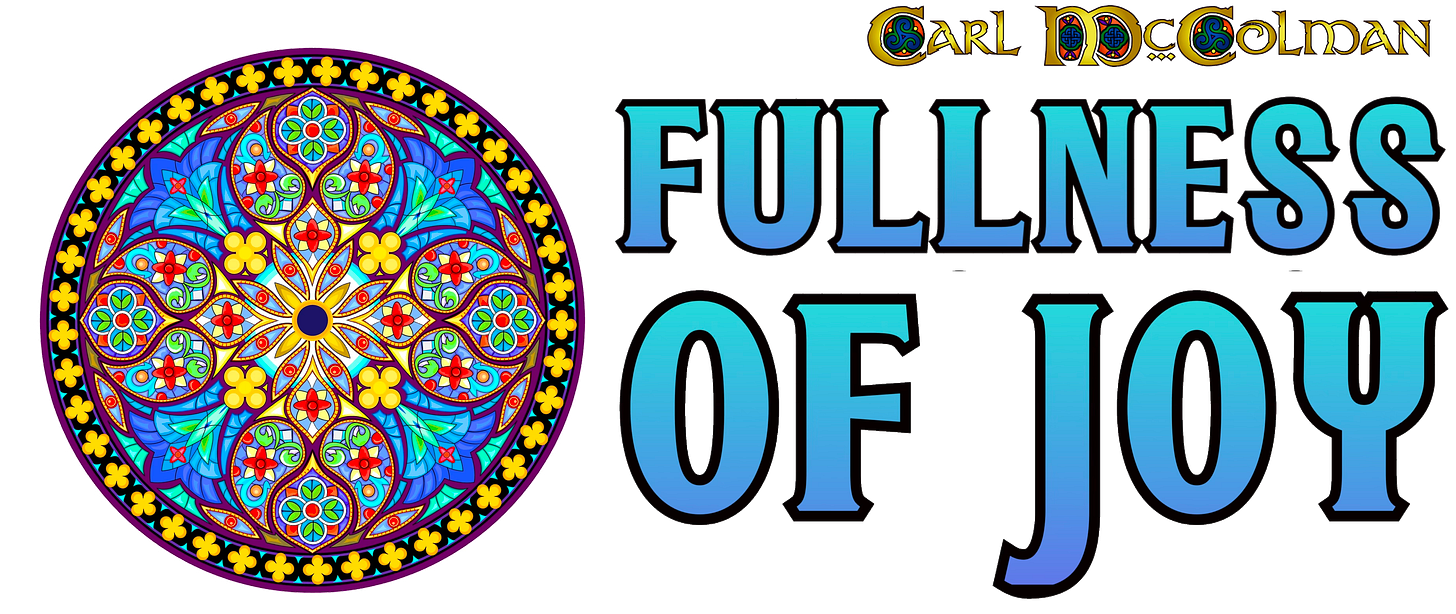Who disappears?
A Zen Abbot Instructs a Catholic Priest in Mystical Indifference.
An American Catholic Priest, who had founded a Zen Center in Japan, visited the abbot of a large Zen monastery. The priest had studied Zen in Japan for a number of years and was known for diligence.
The abbot asked over tea: “Even though you are a Catholic priest, you practice Zazen. What do you feel, when you practice?” The priest replied, “I feel God all around me. I am guided by him and I am in his power.”
Without hesitation, the abbot said, “If you continuously practice zazen, God will disappear.” The abbot’s statement perplexed the priest. He was concerned over the possible loss of his supervision. The priest in response said, “God won’t disappear, I will disappear.” The abbot replied, “Whether God or you disappear, it makes no difference.”
— Zengaku Soyu Matsuoka, Roshi, Moku-Rai, 70.
Sōyū Matsuoka (1912-1997) was one of the pioneers of Soto Zen Buddhism in America, having emigrated from Japan to the United States before the second world war. He served as a Roshi (teacher) to Zen communities in Los Angeles, San Francisco, and Chicago.
His simple story of a conversation between a Catholic priest and a Zen abbot shimmers with insight (I wish I knew who the priest was, but of course that is not necessary to appreciate the wisdom here). On the surface, it may seem as if these two spiritual figures were playing a game of one-upmanship. But I don’t think that’s what’s going on here. The priest is not trying to evangelize the abbot, nor is the abbot attempting to undermine the priest’s faith. If anything, I think the abbot is just pointing out what the priest can expect after persevering in the practice of zazen (meditation).
What does it mean to say that God will disappear?
Surely this is not the same thing as saying “you will lose your faith in God.” In fact, based on what I know about mystical wisdom, I am persuaded that this is the last thing that statement could mean.
Based on what I see in the teachings of apophatic mystics like Pseudo-Dionysius, Meister Eckhart, or John of the Cross, we should expect God to disappear. The deeper we dive into the luminous darkness of singing silence, the more evident it becomes to us that our entire experience of God is a construct. John Lennon once said “God is a concept by which we measure our pain,” but that is limited by his own trauma. God is a concept by which we measure not only pain and suffering, but love and joy and peace, and indeed all experiences, and indeed all life. Eventually there comes a point when we simply no longer see any point in wielding a ruler. We set the measuring stick down — and it disappears. We cannot pick it up again.
Every image of God, every theological proposition regarding God, every way of conceiving God or visualizing God or listening to God or speaking to and with God: eventually they all turn transparent, which is necessary for that is what is needed in order for the light to shine through. As our images and concepts and ideas and theologies of God turn transparent, we can see through them, and then we see them for what they are: windows that reveal, but not that which is revealed. And the more clean and clear the window is, the less we see the window. Eventually we gaze through the perfectly pure window, and it falls away. We are one with all things. And nothing is God.
The deeper we dive into the luminous darkness of singing silence, the more evident it becomes to us that our entire experience of God is a construct.
Many people might find this unsettling, especially to the extent that they cling to the ruler, using the task of measuring all things as a shield against existential anxiety or dread. In Matsuoka Roshi’s story, the Catholic priest becomes perplexed at the thought God will disappear, for “he was concerned over the possible loss of his supervision.”
Is this why we need God? Because we need to be supervised?
Or do we need God because we need an object to trust, faced with the complexity of life and the uncertainty of what follows death? Is God necessary to live a good and compassionate life? But we see that many people who claim to believe in God also seem to lead anything but a caring life. And many people who cling to God fear death (or life) mightily. So I wonder if our reasons for “needing” God are really what we think they are. Perhaps we really do just want — or think we need — a celestial ruler to supervise us. And if this God disappears, who will “watch over” me or you or anyone?
In what seems on the surface to be a retreat, the priest takes refuge in the safety of traditional piety, inspired no doubt by John the Baptist’s words, “He must increase and I must decrease” (John 3:30). “God won’t disappear, I will disappear.” It appears that he is saying, I trust the supervisor more than I trust myself. Which on one hand might be a profound confession of humility, but it could just as easily be a declaration of toxic self-abnegation.
Either way, the abbot is ready: “Whether God or you disappear, it makes no difference.”
It is a hallmark of Ignatian spirituality — and perhaps of mystical Christianity in general — that one of the fruits of a contemplative life is indifference, which doesn’t mean the kind of surly apathy of a teenager muttering “whatever,” but rather a spacious non-attachment to how life unfolds and flows. We all dance between joy and sorrow, pleasure and pain, serenity and suffering. It is normal to try to maximize the serenity and minimize the suffering, but even the most powerful of people eventually find that there is much in life that will forever elude our attempts to manage and control. Sometimes God “disappears” — we feel dry and empty, God seems far away, our faith becomes mired in doubt or despair. Sometimes we “disappear” — we live so purely in the moment that we no longer see, notice, pay attention to the self-conscious self. The disappearance of God might seem terrifying to a person of faith, while the humble disappearance of the self might seem liberating. Once again, though, it makes no difference. The mystical life calls us to be non-attached to self, and non-attached to God. In that non-attachment, does it even matter if God, or I, or we both disappear? What matters is love. Perhaps when we disappear, love flows all the more freely.
On December 10, 1968, Thomas Merton spoke to a conference in Bangkok, and at the end of his talk he mentioned that he needed to take a break, saying, “So I will disappear, and we can all have a Coke or something.” Not long after that he died. Never mind the reference to America’s favorite soft drink: Merton announced that he would disappear. I can’t think of a more Zen way of speaking one’s last words.
N.B. Today’s post is joyfully dedicated to Andō and to James Ishmael Ford. Their words of contemplative wisdom may be found at “Silentium” and at “Unanswered Questions.”






I'm puzzled by the lack of a distinction between construct and experience. A construct is conceptual and in the examples here smacks of theology. An experience is something else. I appreciate the Zen story and commentary, but this might be more complicated than what is presented here.
Nancy Mujo Baker